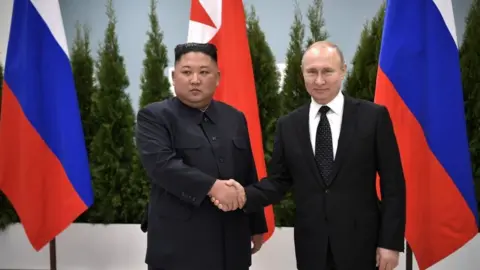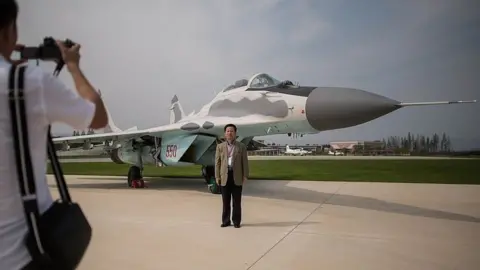Russia vows to expand relations with North Korea
 Getty Images
Getty ImagesRussia and North Korea will expand their "comprehensive and constructive bilateral relations", President Vladimir Putin has said.
In a letter sent to his counterpart Kim Jong-un on Pyongyang's liberation day, Mr Putin said the move would be in both countries' interests.
In turn, Mr Kim said friendship between both nations had been forged in World War Two with victory over Japan.
He added that their "comradely friendship" would grow stronger.
The Soviet Union was once a major communist ally of North Korea, offering economic co-operation, cultural exchanges and aid.
According to North Korean state news agency KCNA, Mr Putin said expanded bilateral relations would "conform with the interests of the two countries".
In his letter, Mr Kim said the Russia-North Korea friendship "forged in the anti-Japanese war" had been "consolidated and developed century after century".
It added "strategic and tactical co-operation, support and solidarity" between the two countries "had been put on a new high stage, in the common front for frustrating the hostile forces' military threat and provocation".
Pyongyang did not identify the hostile forces by name, but the term has been used repeatedly by North Korea to refer to the US and its allies.
 AFP
AFPSpeaking at an arms show near Moscow on Monday, President Putin said: "We are ready to offer allies and partners the most modern types of weapons - from small arms to armoured vehicles and artillery, combat aircraft and unmanned aerial vehicles."
He boasted that Russian weapons were valued for their "reliability, quality" and said "almost all of them have been used in real combat operations more than once".
Russia's invasion of Ukraine on 24 February has proven costly for the Russian military, however, despite its advanced weapons such as cruise missiles. The smaller Ukrainian forces have less firepower, but that includes various Western weapons, which have inflicted heavy losses.
In July, North Korea was one of the few countries that officially recognised two Russian-backed separatist "people's republics" in eastern Ukraine, after Russia signed a decree declaring them as independent. In retaliation, Ukraine cut off all diplomatic ties with Pyongyang.
Russian forces are still trying to consolidate their grip on the Donetsk and Luhansk regions, against fierce Ukrainian resistance.
Many of North Korea's Russian-designed weapons are old, from the Soviet era. But it has missiles similar to Russian ones.
The Russian ambassador to Pyongyang, Alexander Matsegora, told Russia's Izvestia daily that closer co-operation could mean "highly skilled, industrious" North Korean workers helping to rebuild the damaged infrastructure of Russian-controlled Donetsk and Luhansk.
He also said Pyongyang was keen to get replacement parts for Soviet-era heavy equipment delivered to its factories and power plants from eastern Ukraine. He said Slovyansk and Kramatorsk - cities still held by Ukrainian forces - were major centres for that equipment.
Russian-North Korean relations declined after the Soviet Union's collapse in 1991, but gradually picked up as Russia's relations with the West soured in recent years.